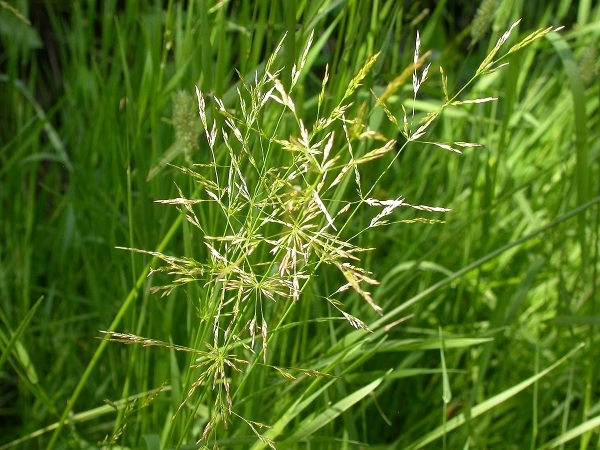
Creeping Bentgrass
Botanical Name
:
Agrostis stolonifera
Plant Type
:
Cool-season perennial grass
Seasons
:
Active growth during spring and fall; may exhibit reduced growth or stress during hot summer months
Sun Level
:
Aim for at least 6 hours of sun daily, but tolerate light shade
Ideal Soil Temperature for Planting
:
50–65°F (10–18°C)
Soil Type
:
Well-drained, moist, and fertile soils
Hardiness Zones
:
3a, 3b, 4a, 4b, 5a, 5b, 6a, 6b
Germination
:
Seeds germinate within 7 to 15 days under optimal conditions
P.H. Level
:
5.5–6.5, but it can adapt to higher pH levels
Water/Irrigation
:
Requires consistent moisture due to its shallow root system. Frequent, light watering to maintain moisture
Fertilization
:
Apply 4 to 6 pounds of nitrogen per 1,000 square feet annually, divided throughout the growing season
Habit
:
Spreads via stolons, forming a dense, low-growing turf
Final Plant Height
:
If left unmowed can reach up to 12 inches, however, it is typically maintained at below 0.5 inches
Spread
:
Aggressively spreads through stolons, covering ground rapidly
Spacing
:
1 to 2 pounds per 1,000 square feet for lawns
Flowers
:
Produces inconspicuous flower spikes in late spring to early summer
Attracts
:
Provides dense cover for small mammals and birds
Uses
:
Lawn and turf grass, forage for large animals, hay, gardens, landscapes, and golf course putting greens
Companions
:
Typically used as a monoculture due to its aggressive growth habit, not commonly mixed with other grass species
Pruning
:
Frequent mowing to maintain the desired height, typically kept at 0.1 to 0.5 inches for golf courses
Toxicity
:
Non-toxic to humans and pets
Pests
:
Susceptible to insects such as cutworms, sod webworms, and white grubs
Diseases
:
Prone to diseases like dollar spot, brown patch, and pythium blight, especially under humid conditions
Did You Know?
Despite its advantages on golf courses, Creeping Bentgrass is often considered a weed in home lawns due to its invasive nature and high maintenance requirements
Botanical Name
:
Agrostis stolonifera
Plant Type
:
Cool-season perennial grass
Seasons
:
Active growth during spring and fall; may exhibit reduced growth or stress during hot summer months
Sun Level
:
Aim for at least 6 hours of sun daily, but tolerate light shade
Ideal Soil Temperature for Planting
:
50–65°F (10–18°C)
Soil Type
:
Well-drained, moist, and fertile soils
Hardiness Zones
:
3a, 3b, 4a, 4b, 5a, 5b, 6a, 6b
Germination
:
Seeds germinate within 7 to 15 days under optimal conditions
P.H. Level
:
5.5–6.5, but it can adapt to higher pH levels
Water/Irrigation
:
Requires consistent moisture due to its shallow root system. Frequent, light watering to maintain moisture
Fertilization
:
Apply 4 to 6 pounds of nitrogen per 1,000 square feet annually, divided throughout the growing season
Habit
:
Spreads via stolons, forming a dense, low-growing turf
Final Plant Height
:
If left unmowed can reach up to 12 inches, however, it is typically maintained at below 0.5 inches
Spread
:
Aggressively spreads through stolons, covering ground rapidly
Spacing
:
1 to 2 pounds per 1,000 square feet for lawns
Flowers
:
Produces inconspicuous flower spikes in late spring to early summer
Attracts
:
Provides dense cover for small mammals and birds
Uses
:
Lawn and turf grass, forage for large animals, hay, gardens, landscapes, and golf course putting greens
Companions
:
Typically used as a monoculture due to its aggressive growth habit, not commonly mixed with other grass species
Pruning
:
Frequent mowing to maintain the desired height, typically kept at 0.1 to 0.5 inches for golf courses
Toxicity
:
Non-toxic to humans and pets
Pests
:
Susceptible to insects such as cutworms, sod webworms, and white grubs
Diseases
:
Prone to diseases like dollar spot, brown patch, and pythium blight, especially under humid conditions
Did You Know?
Despite its advantages on golf courses, Creeping Bentgrass is often considered a weed in home lawns due to its invasive nature and high maintenance requirements
Written by Salome Wapukha – https://www.linkedin.com/in/salome-wapukha-556700193/

